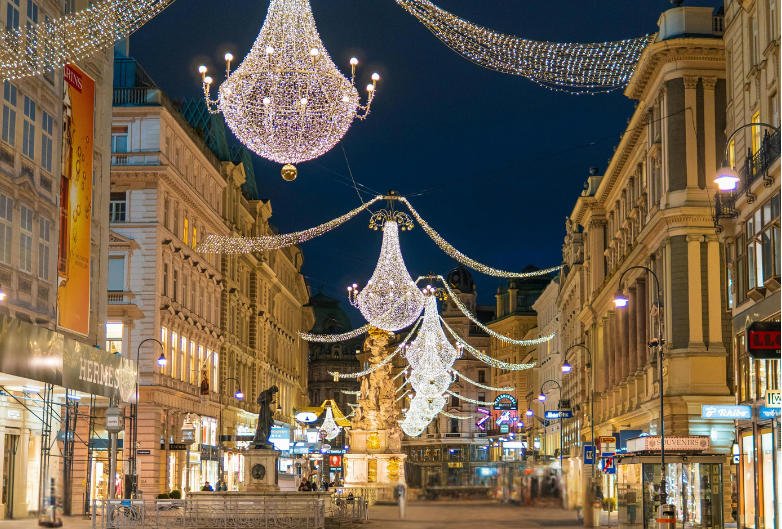Becoming an international student at an Austrian university comes with its fair share of bureaucratic challenges. Despite this, there are some students who manage to work their way through the process on their own. In our first podcast, we speak to one such student: Anna, an international student at the University of Vienna.
Anna’s journey began when, as a 17-year-old student, she left her home in Russia to pursue her dream of studying abroad and experiencing international student life in Vienna. A brief stopover in Vienna, on her way to a family holiday, planted a seed that would, years later, change the course of her life.
Navigating the Austrian bureaucracy proved anxiety-inducing for Anna. Even the seemingly straightforward university application process left her nervously waiting for three months to find out if her application had been successful. Interestingly, Anna had taken a somewhat risky approach by applying for only one course at one university, unaware that she could apply to multiple Austrian university programs simultaneously. Fortunately for Anna, the gamble paid off.
The challenge of the Student Residence Permit
However, the residence permit was more of a challenge; knowing which documents to collect and what online information was accurate and up-to-date made Anna question her process. She scoured Russian, English, and German websites for official requirements, and eventually gathered the necessary paperwork.
Yet, even with meticulous organisation, it didn’t quite go to plan. Anna’s initial visit to the Austrian embassy in Moscow revealed missing documents and the need for additional photocopies (which the embassy could not help her with), and so she was asked to return the next day. While this inconvenience was manageable for Anna, it highlights a common issue faced by many hopeful international students. The residence permit process took another nerve-wracking three months, leaving Anna in suspense without any updates.
There was one issue that Anna raised that we have heard on many occasions: the embassy asking her to provide her definitive arrival date in Austria – a mandatory requirement – before she had been given a confirmed date by the university. This also meant that she would need to secure accommodation at the time of applying for her residence permit. Anna had conducted extensive online research to find and secure her ‘new home’, as her only real experience of Vienna was the first district, which she visited during a short layover in Vienna with her family when she was around 11-years-old! She eventually settled on a student dormitory in Vienna’s 10th district and was surprised by just how different it was from the first district.
There are 23 districts in Vienna in total and each has their own personality and charms. We strongly advise prospective students to consider their options carefully when planning their move to Austria, and ideally, to visit the different districts before making their final decision.
Culture shock in Austria
Once she had arrived in Austria, Anna was to begin her new life. Alone in a new city and not knowing “how independent life works”, Anna found it all a bit overwhelming, and not unreasonably. She didn’t know anyone and though she had learnt German in school, it was still a new language for her and she found understanding the spoken language difficult (especially as most people learn ‘Hoch Deutsch’, high German – and Austrian-German is quite different).
Although her impressions of Vienna itself were positive – a beautiful city that was comfortable and convenient, Anna describes it as “smaller than Moscow – Vienna feels like a small town”. She liked how you could get from one place in the city to another in around 20 minutes.
Anna had heard about 'Wiener Grant' (the Viennese attitude that has earned the city a reputation for being grumpy and rude), but says she didn't really notice it herself – she had made friends from Russia, Austria and other countries around the world, and in general, she is very happy with the people around her.
When I asked her about her biggest culture shocks in Austria, two stood out. One of the biggest culture shocks for Anna was that supermarkets are closed on Sunday: “I still hate it!”. And the other was the ‘paper culture’ – she was shocked at how much official paperwork she received in the post: “Austrians are friends of paper” – different to Russia, where many transactions are done online.
Our advice to Austrian residents is to regularly check your mailbox, otherwise you may miss deadlines and important official information!
Job search
Her life changed again with finding a job. Soon-to-be graduate Anna is approaching the end of her studies, and was nervous about life after university. She was worried about whether she would be able to obtain a new visa and permit and if she could “become a local and feel at home”. Acquiring a job gave her a sense of security and a future in Austria. Being fresh out of university, she didn’t have much to compare with in terms of business life but one thing she has struggled with is small talk. It is not something that is done in Russia, but she found in Austria, every meeting or call starts with small talk. She still finds it a bit uncomfortable.
“All these tiny cultural things are always very overwhelming for you at the beginning”. The subtle cultural differences, often unnoticed at first, can be the most surprising. This sentiment resonates with many expats around the world, emphasising the benefit of an open mindset to turn challenges into beautiful experiences.
🎧 Hear Anna's full story in our podcast: To Austria as a student - Interview with Anna. 🎧
Editor's note: This post was originally published in 13th January 2024 and has been completely revamped and updated for comprehensiveness.




